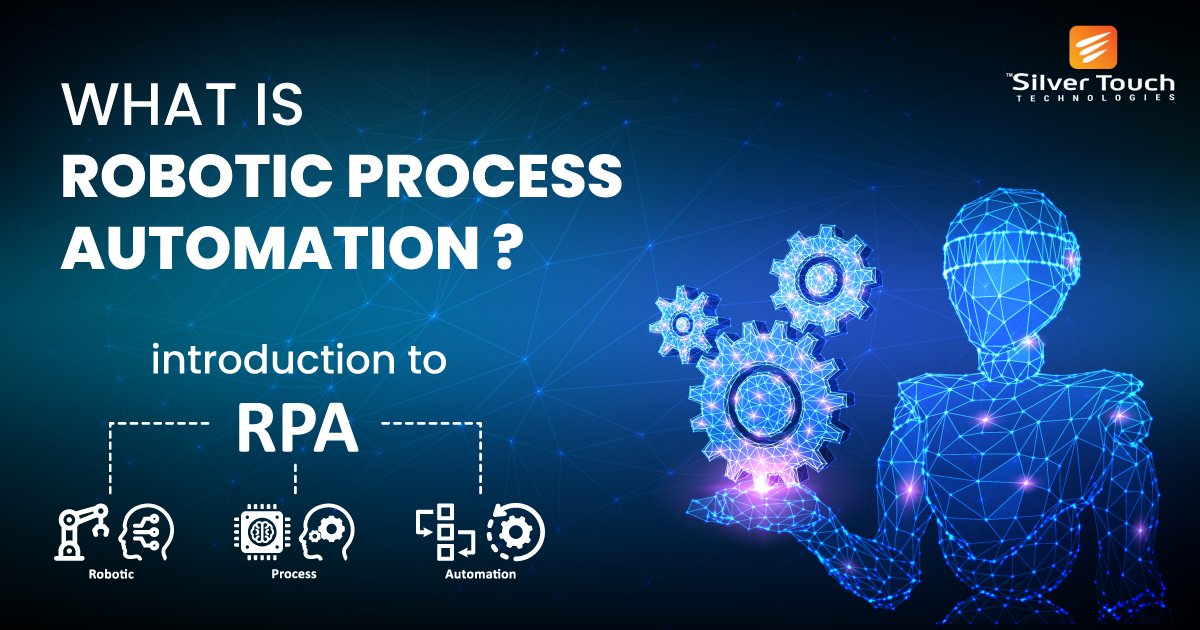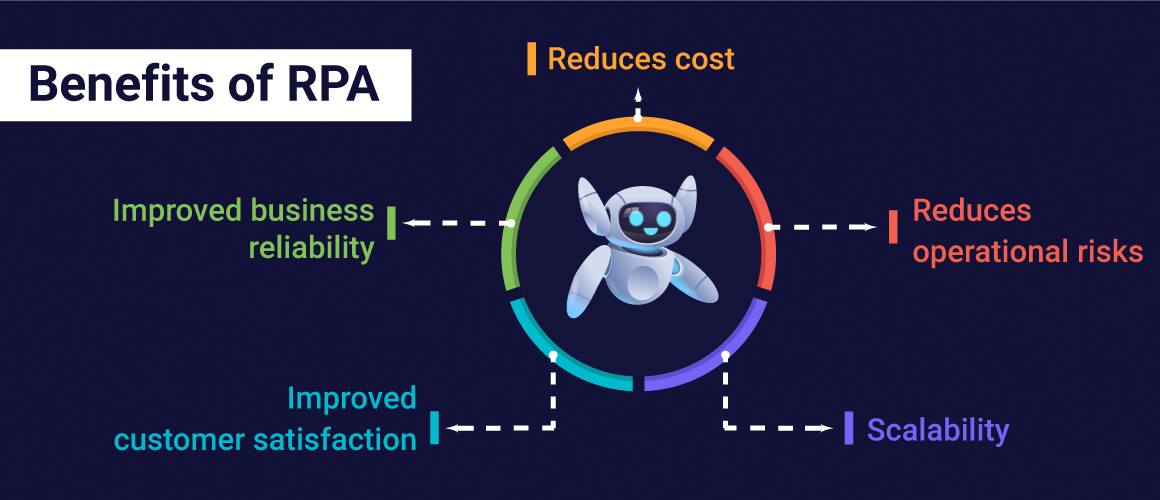When we talk about RPA Managed Services, one of the most frequently used words today is “automation.” And not only that, but it’s also a crucial component of almost any enterprise IT strategy. In essence, the usage of automation technology has grown to entirely new heights.
One such addition to the rapidly expanding automation industry is robotic process automation or RPA. And we’ll cover practically every aspect of RPA and RPA managed services in this blog post so you can implement this revolutionary technology without any hurdles.
What is RPA: A Quick Overview
Robotic process automation (RPA) entails the use of software with artificial intelligence (AI) and machine learning (ML) abilities to handle repetitive, high-volume operations that typically require manual input. A few of these tasks are:
- Addressing queries
- Making calculations
- Maintaining records
- Making transactions
Robotic process automation imitates user interface (UI) level user behavior. The developer need not be concerned with the underlying intricacies as long as the bot can follow the instructions.
Think about how a corporation onboarding a potential employee. For this, it is required to create a new user account, email address, access rights, document retrieval, etc. which requires a lot of manual effort. However, Robotic Process Automation can automatically trigger a template for the onboarding processes.
Having stated that an RPA managed services can quickly evaluate, prepare, and produce new employee data, deliver offer letters, and simplify communication throughout the systems.
The Different Types of RPA Managed Services

Robotic process automation can be divided into three categories:
Attended Automation
This automation process requires human assistance for automating operations.
Unattended Automation
These devices are sentient and capable of making decisions by themselves, without the need for human interference.
Hybrid RPA
These tools will include both attended and unsupervised automation tool features. They deal with both front- and back-office duties in the company.
How Does RPA Managed Services Work?
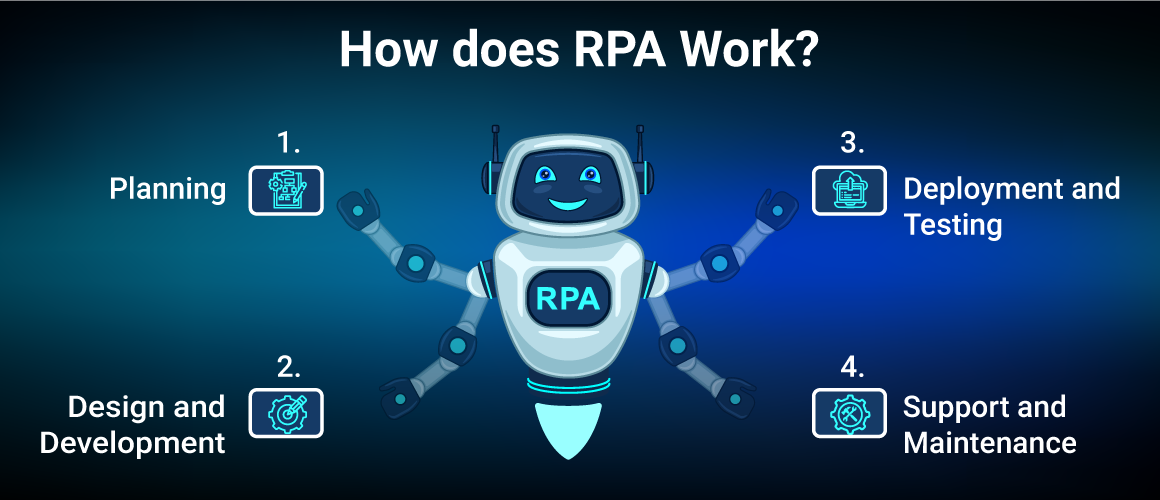
Four primary stages of RPA Managed Services:
Planning
As the name suggests, all the planning regarding the process along with the test objects, the implementation strategy, and a clear road map for the RPA implementation gets situated.
Design and Development
You begin creating the automation workflows in this step in accordance with the predetermined plan.
Deployment and Testing
The bots are executed during this phase. During the deployment, any unforeseen outages will be managed. It is essential to test these bots for flaws and defects to ensure accurate operation.
Support and Maintenance
Constant support makes it easier to identify and fix mistakes. This is a life-long process and ensures that the quality is maintained in the overall RPA managed services.
RPA Managed Services Tools
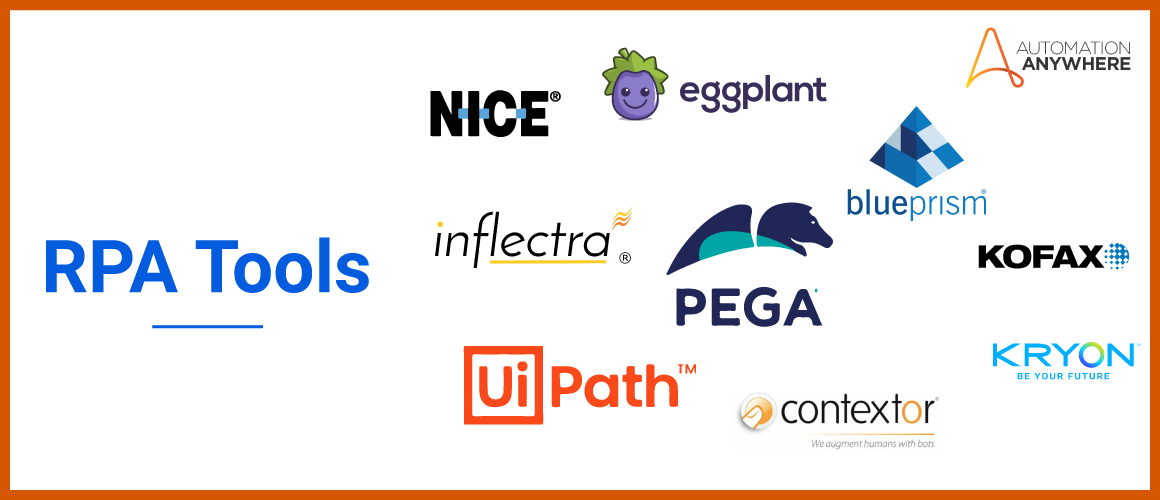
The software that businesses and organizations use to buy RPA managed services is known as RPA software tools. Every piece of software is diverse in its features and functions. There are two categories of RPA tools: programmable and no-code RPA. Developers and programmers who want the RPA to operate in a specific way should opt for programmable RPA.
- Keysight’s Eggplant
- Inflectra Rapise
- Blue Prism
- UiPath
- Automation Anywhere
- Pega
- Contextor
- Nice Systems
- Kofax
- Kryon
Benefits of RPA Managed Services
Workflows are streamlined through robotic process automation, which helps businesses become more profitable, adaptable, and responsive. By reducing menial duties from their workdays, it also boosts employee satisfaction, engagement, and productivity.
Reduces cost
The rapid cost reduction is one of the main benefits of RPA. A business can cut costs by up to 30% by automating tasks because software robots are less expensive than full-time employees.
Reduces operational risks
There is a risk of inefficiency and human mistake when a complex job is outsourced to outside entities by some businesses. RPA managed services provides a superior solution due to the lower operational risk because the work is done inside.
Scalability
RPA managed services enables businesses to easily scale up or down operations in response to changing circumstances and make adjustments depending on other important aspects.
Improved customer satisfaction
Customers receive high-quality material because accuracy is maintained and operational risk is low.
Improved business reliability
They are trustworthy because they carry out tasks as directed and in accordance with rules and regulations. RPA manages services relieve employees of the stress brought on by a pile of tasks and fatigue.
Limitations of RPA Managed Services
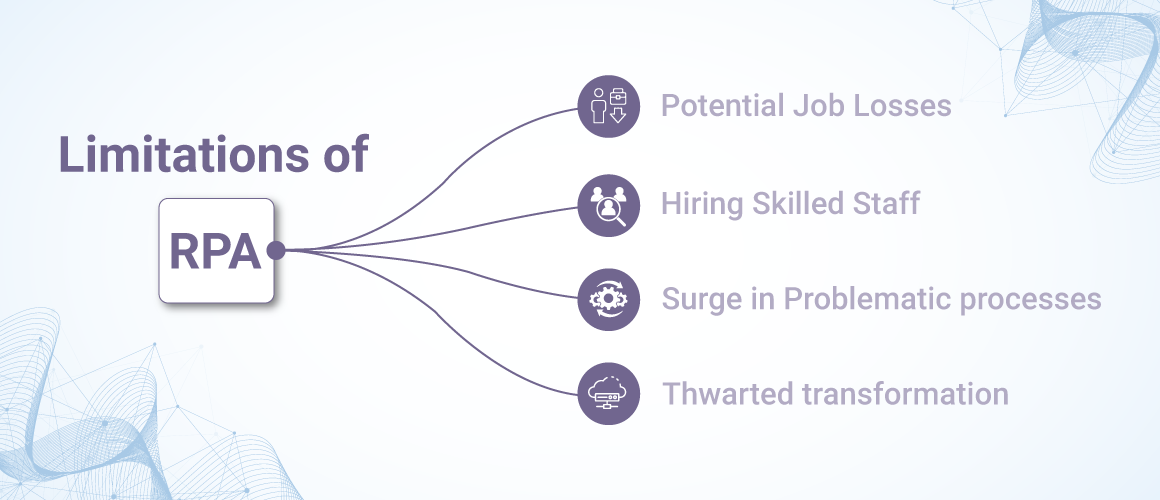
Potential Job Losses
It is anticipated that there won’t be a need for human involvement if a robot can function more quickly and steadily. It is the employees’ top issue, and this poses a serious danger to the employment market.
Hiring Skilled Staff
In order to effectively use RPA, staff members need to be highly skilled in automation, as operating robots may require programming knowledge. Additionally, it forces businesses to either hiring skilled workers or invest in training the existing ones.
Surge in Problematic processes
Organizations that automate processes without first reviewing them and, if required, reengineering and optimizing them run the danger of automating problematic processes, according to experts.
This entails enhancing inefficiencies, mistakes, and everything else that was initially problematic with the process. Additionally, it introduces new risks and costs that may cancel out any anticipated ROI.
Thwarted transformation
Executives who view RPA manages services as a tactical, point-by-point solution rather than a tool used for comprehensive plans would find more limited benefits.
Enterprise executives must have a strategic plan for prioritizing their automation projects and know how all those projects fit into their larger strategic visions if they want RPA to help their digitization goals.
Where can RPA Services be used?
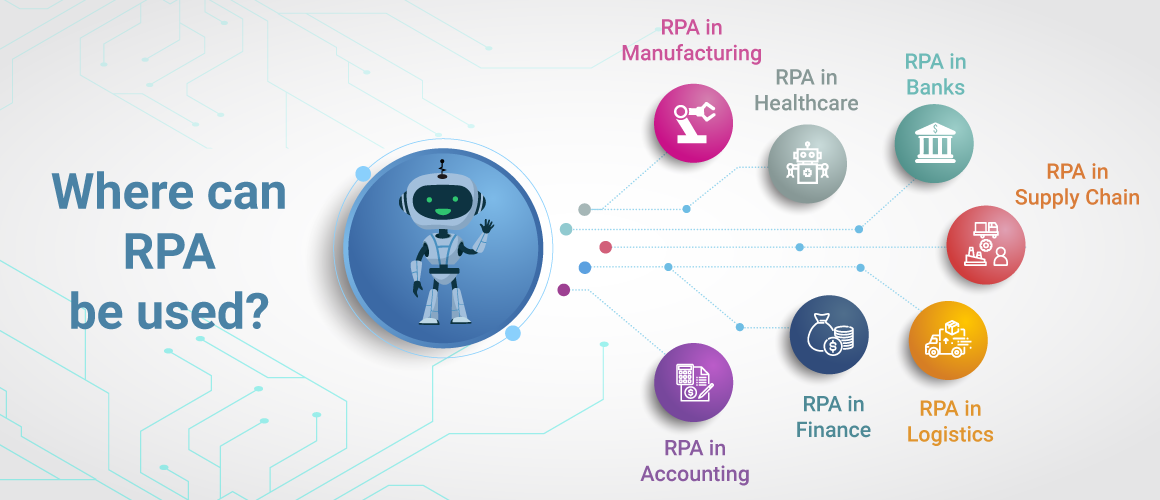
RPA in Manufacturing
Robotic process automation in manufacturing can assist companies in concentrating more on core competencies and product innovation rather than mundane but essential daily repetitive labor.
To improve process execution speed and accuracy, rule-based procedures can be automated via robotic process automation. Additionally, RPA managed services don’t require coding expertise and are simple to use. RPA also easily interfaces with legacy systems already in place without the need for expensive and time-consuming software development.
RPA in Healthcare
With more precise diagnosis and treatment, these insights can help healthcare providers and enhance the patient experience of care.
RPA managed services can also be used to control post-discharge care, enabling patients to recuperate with assurance at home after leaving a medical facility. In addition, it can remind individuals to take important measurements, like their blood pressure, and then alert medical staff if something seemed out or concerning.
RPA in Banks
RPA assists banks and accounting divisions in automating repetitive manual operations, allowing staff to concentrate more on important activities and giving the company a competitive edge.
Banks use intelligent automation to improve RPA by integrating artificial intelligence tools like machine learning and natural language processing. RPA managed services can handle complex procedures, comprehend spoken language, identify emotions, and adjust to real-time data.
RPA in Supply Chain
A supply chain consists of processes that are necessary to get a good or service to the consumer. Vendors, retailers, manufacturers, warehouses, transportation companies, and distribution centers are a few of the entities involved in the supply chain.
RPA in Supply Chain enables supply chain enterprises to quickly scale up to meet demand-driven supply chain business demands. It will streamline partner onboarding, order fulfillment and payment, shipment planning and tracking, invoicing, etc.
RPA in Logistics
The business must ensure that goods are delivered, transported, and kept properly when it comes to logistics management. Organizational efficiency can be increased by automating logistics management procedures.
By automating operations, enhancing business operations, cutting costs, and raising production, robotic process automation (RPA) can boost the efficiency of the logistics sector.
RPA in Finance
By progressing from individual job automation to complete process automation, RPA managed services automate finances and could increase the precision of financial analyses and projections. Finance robotics must be used in conjunction with other intelligent automation technologies to automate financial activities.
One should know the correct ways to deploy financial robots and should discuss with the team the structure, as well as know where and how to deploy finance robotics in the most effective ways.
RPA in Accounting
Today’s accountants work with tools and procedures that rely on computers but need several keystrokes and manual steps. RPA can change the way accounting processing is done by fusing various manual tasks into one easy automated procedure.
RPA bots perform a task within a process by imitating human activities. These computer programs can carry out repeated activities swiftly, precisely, and reliably. RPA offers accountants a special way to streamline their accounting procedures.
What makes RPA the fastest-growing enterprise software?
The fact that RPA enables companies to partially automate old processes without disassembling and replacing old systems is one of the major factors. The main advantage of RPA initiatives is their capacity to incorporate existing systems. RPA technology can hasten the digital transformation efforts of large-scale legacy businesses.
RPA managed services these operations by utilizing cutting-edge technology. For businesses, getting actionable insights from these data is essential. New technological elements like data scraping, data analysis, and machine learning can be included in RPA software.
Businesses across the world choose RPA managed services because of these features. Some of the other prominent reasons are mentioned below: They provide exceptional ROI.
It increases productivity by diverting workers from menial duties and allowing them to concentrate on profitable, revenue-generating activities. Software bots operate faster and with more accuracy than humans. They operate continuously
Are you ready for RPA? Let us help you
RPA is the fastest-growing enterprise software in the world according to Gartner. Silver Touch Technologies plans and integrates this enterprise software that is rapidly expanding in accordance with your company’s requirements. Contact us if you’d like to know more about our RPA managed services or to learn more about the same.
RPA FAQs
Robotic Process Automation or RPA is a type of software that you may create to automate repetitive processes. RPA managed services accomplish the objective of operations automation because these tasks are rule-based and typically performed manually.
Overall output is increased along with improved efficiency to produce savings. Additionally, it enhances business data security and consistently meets accuracy standards.
The three types of RPA are Attended Automation, Unattended Automation, and Hybrid RPA

